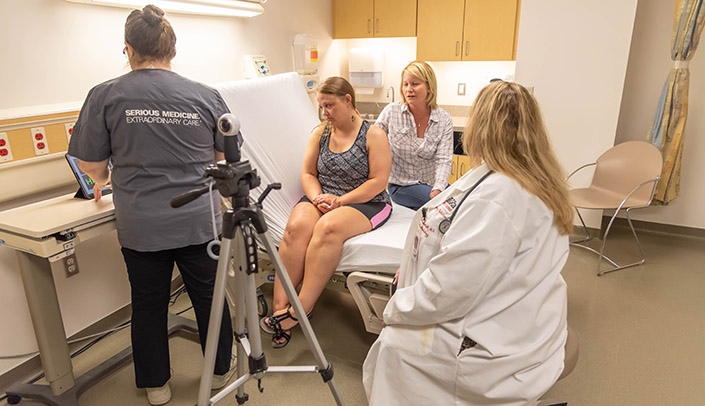A team from the UNMC Department of Emergency Medicine filmed three case scenarios dealing with human trafficking last week, using virtual reality (VR) technology to provide learners a more immersive training environment.
The idea behind this initiative is to use VR technology to recreate rare clinical pathologies that learners otherwise would not experience. The team is working with UNMC’s Interprofessional Experiential Center for Enduring Learning (iEXCEL) on this project. The team also is in early talks with the FBI and Douglas County Sheriff’s Office to develop similar scenarios for their officers.
Aaron Barksdale, M.D., associate professor and research director for the department, and Cynthia Hernandez, M.D., assistant professor in the department, developed the trafficking scenarios.
“We’ve always known that if we can capitalize on virtual reality, we can recreate the more rare clinical scenarios,” said Thang Nguyen, an adjunct faculty instructor with the department and an advanced nurse practitioner for Nebraska Medicine. “Trafficking is one of those scenarios where I may have personally encountered those victims but not have known I was in that scenario because I had not had formal training.”
Making the scenario an immersive VR experience will increase retention, Nguyen said. “Not only are you immersed in the scenario, you’re actually standing right next to the patient.”
The scenarios feature female actors recreating disease pathologies that might not typically be associated with human trafficking. The scenarios include abdominal pain, painful urination (dysuria) and shortness of breath/asthma.
The videos will be used to train emergency medicine health professionals on some of the subtle things to be aware of that might be a forewarning that someone is a human trafficking victim. The emergency medicine team recently received a grant and will use the funding to host a lectureship on human trafficking in Japan.
“We’re shooting to have these videos done by the first week of July, because we are planning to take this to Japan,” Nguyen said. “Then, we’ll give Dr. Hernandez time to incorporate these modules into her lectures, and we’ll roll them out for students for the fall.”
